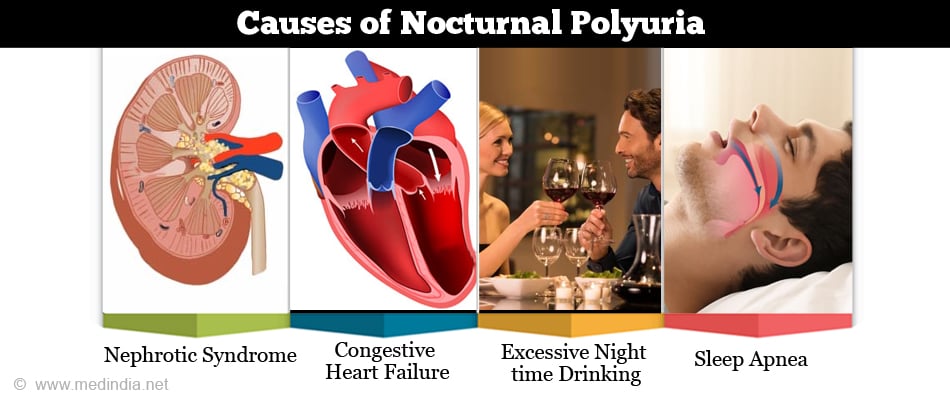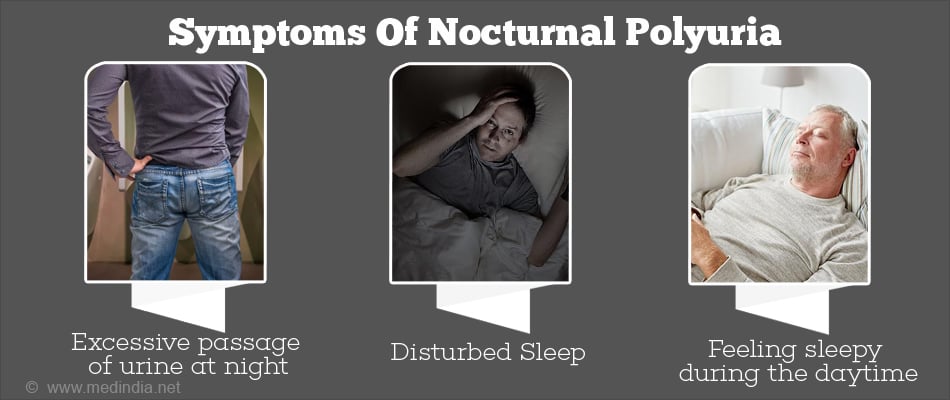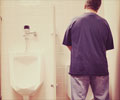- Nocturnal polyuria: frequently Asked Questions - (http://www.camurology.org.uk/wp-content/uploads/nocturnal-polyuria-31.pdf)
- Why Does Nocturnal Polyuria Syndrome Happen? - (http://flotrolbladdercontrol.org/2016/04/30/nocturnal-polyuria-syndrome-nps-the-nocturia-condition/)
- Nocturia - (https://en.wikipedia.org/wiki/nocturia)
- Algorithmic Approach for the Diagnosis of Polyuria - (https://www.ncbi.nlm.nih.gov/pubmed/24040989)
What is Nocturnal Polyuria?
Nocturnal polyuria syndrome is the passage of increased urine during the night, waking the patient up from sleep. The urine output equals more than 20% of the daily total in younger persons and more than 33% in elderly individuals.
It is important to remember that persons with nocturnal polyuria syndrome have normal 24 hour urinary output not exceeding 40 ml/kg body weight.
A measurement devised to standardize the clinical diagnosis of nocturnal polyuria syndrome is the nocturnal polyuria index (NPi) i.e. the nocturnal urine output as a percentage of the 24-hour urine output. Persons with NPi greater than 35 percent are said to have nocturnal polyuria.
It is one of the underlying causes of nocturia, which is defined as the increased passage of urine during night, waking the patient up from sleep.
Nocturia has a total of four major underlying causes -
- Global polyuria – Urine output increases throughout the day, and the total 24 hour urine output exceeds 40 ml/kg body weight.
- Nocturnal polyuria – Urine output increases at night with proportional decrease in daytime urine output. The total 24 hour urine output therefore remains normal.
- Bladder storage disorders that decrease the bladder capacity – enlarged prostate, neurogenic bladder, drugs, anxiety
- Mixed causes
The first two conditions are associated with abnormal levels of arginine vasopressin (AVP) or atrial natriuretic hormone (ANH). The third condition is a bladder problem.
What is the Prevalence of Nocturia?
Statistics show that 5-15% of people between 20-50 years, 20-30% of people between 50–70 years, and 10-50% of people older than 70 years old urinate at least twice a night. Nocturia increases with age.
More than 50 percent of men and women over the age of 60 have been found to have nocturia in many communities. The incidence rises in persons above the age of 80 years.
Nocturia occurs equally among both sexes, but the incidence is higher in younger women compared to younger men and in older men compared to older women.
What are the Causes of Nocturnal Polyuria?
Nocturnal polyuria is due to hormonal imbalances and patients with NPS have low levels of arginine vasopressin (AVP). Other reasons for nocturnal polyuria include the following conditions.
- Nephrotic syndrome
- Liver failure
- Congestive heart failure
(In liver, kidney and heart disease, the person has swollen feet and ankles during the day due to fluid accumulation (by gravitation on standing), but on lying down this fluid passes into the bloodstream and is excreted by the kidneys resulting in nocturnal polyuria.)
- Excessive night time drinking
- Consuming water rich foods at night (fruits, vegetables, rice, pasta, salads)
- Increased airway resistance in obstructive sleep apnea

Abnormal circadian rhythm has also been found to occur in nocturnal polyuria syndrome.
Function of AVP or Antidiuretic Hormone (ADH)
The brain in healthy patients secretes a substance called antidiuretic hormone or ADH in the evening. This signals the kidneys to decrease the quantity of urine formed while a person is asleep. In persons less than 65 years, this will reduce urine output to one fifth of normal 24 hour urine output. For those over the age of 65 years, ADH will reduce urine output to one third of your normal 24 hour urine output.
What are the Symptoms of Nocturnal Polyuria?
The symptoms of nocturnal polyuria are -
- Excessive passage of urine at night, on one or more occasions
- Disturbed sleep
- Difficulty falling asleep after the awakenings
- Feeling sleepy during the daytime
- Decreased daytime urine output

How do you Diagnose Nocturnal Polyuria?
A detailed history of the problem is necessary to establish what is normal for the patient and setting the baseline.
The principal diagnostic tool for nocturia is the voiding bladder diary. Timing of voids, number of emptyings, and volume of urine voided at day and night should be recorded in the diary. The volume of fluid intake and time of intake should also be recorded.
Based on information recorded in the diary, a physician can identify whether the patient is having polyuria, nocturnal polyuria, or bladder storage problems. The first morning void should be included in the nocturnal urinary volume (NUV).
The International Continence Society (ICS) defines NUV as “the total volume of urine passed from the time the person goes to bed with the intention of sleeping and the time of waking with the intention of rising.”
Thus, as stated above, the NUV measurement omits the last void before going to bed, but includes the first morning void if the urge to pass urine awoke the patient.
Persons with nocturnal polyuria have a nocturnal polyuria index (NPi) (the nocturnal urine output as a percentage of the 24-hour urine output) greater than 35% of the normal 24-hour urine volume.
How do you Treat Nocturnal Polyuria?
Consulting your family physician about Nocturnal Polyuria Syndrome or Nocturia should be the first step. You may be referred to a nephrologist for further evaluation and management.
Pharmacological Management:
Desmopressin acetate is a synthetic analogue of arginine vasopressin. It is administered as a nasal spray about an hour before bedtime and leads to reduced production of urine during sleep, and reduces the incidence of nocturia and awakenings from sleep.

The most common adverse events are nausea, diarrhea, abdominal pain, headaches, dry mouth and hyponatremia both in the short-term and long-term trials. Patients on desmopressin should cut down fluid intake for 1 hour before and 8 hours after the use of desmopressin.
A diuretic (or water expelling agent) may be prescribed at tea-time to enable the kidneys to expel the urine in the evening and ensure undisturbed sleep at night.
Imipramine – This may be prescribed to inhibit bladder activity at night.
Non-pharmacological Treatment:
A few things that could help reduce the need to urinate at night include the following simple measures -
- Drinking less fluids and eating foods that contain lots of fluids in the evening
- Opt to eat high fluid containing foods in the morning and mid-afternoon
- Regular exercise
- Bladder supplement such as Flotrol may help reduce urinary frequency at night
- Home remedies such as pomegranate paste, fenugreek seeds, cranberry juice, apples, bananas, boiled spinach, aloe vera juice, yoghurt, cinnamon powder and jaggery are suggested as natural remedies to reduce frequency. However, it is advisable to consult your doctor if these do not offer relief.
To calculate total urine output please download our Voiding Diary Form








